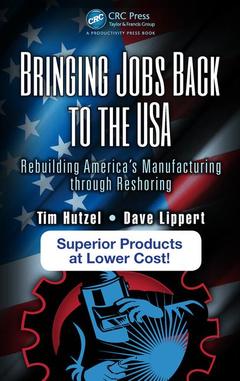Description
Bringing Jobs Back to the USA
Rebuilding America’s Manufacturing through Reshoring
Authors: Hutzel Tim, Lippert Dave
Language: English
Subjects for Bringing Jobs Back to the USA:
Keywords
Cash Conversion Cycle; USA; Reshoring of american jobs; Offshoring Decision; offshoring of jobs; United States; sending jobs overseas; Lean Management System; Bringing American Jobs Back Home; Hoshin Planning; Onshore manufacturing; Cash; Offshoring Companies; cR Cv; Radio Flyer; Pay For Performance; Master Lock; Red Wagon; Appliance Park; Ft Sh; LEVI STRAUSS; Completion Dates; Hershey Company; Chocolate Candies; Es Sa; Fourth Grade Education; Ga Ug; Qu Ali; East Peoria; Flea Infestation
Approximative price 40.18 €
In Print (Delivery period: 15 days).
Add to cart· 15.6x23.4 cm · Hardback
Description
/li>Contents
/li>Readership
/li>Biography
/li>
A follow-up to Tim Hutzel's previous book, Keeping Your Business in the USA: Profit Globally While Operating Locally, this book tells the stories of companies that have sent their jobs outside of the USA and the negative effects this had on the quality of their products and services, employees, supply chain providers, and consumers.
Bringing Jobs Back to the USA: Rebuilding America's Manufacturing Through Reshoring reveals the motivation these companies had to offshore their jobs as well as the errors of omission they made by not understanding the true cost of offshoring. Exposing the true cost of offshoring to US organizations and citizens, it supplies concrete suggestions to help government officials and activists prevent offshoring and incentivize reshoring.
The book provides food for thought for businesses currently thinking about sending US jobs to foreign countries. Outlining a roadmap for reshoring using a step-by-step methodology, it provides business leaders with the understanding to make the right decisions regarding reshoring their products back to America.
Watch the authors discuss how manufacturing and jobs can be shifted back to the USA.https://youtu.be/EwQf50rdlFA
The Story of Reshoring. The Hershey Kisses Story. Devastating Trends to Our Economy and Our American Way of Life Caused by Offshoring. The Reshoring Trend. A Decision-Making Model to Reshore … or Not. Prepare for Reshoring. Making the Decision to Reshore Is Just the Beginning. Looking into the Future.
Tim Hutzel was born into a blue collar family in a very small town in southwestern Ohio in 1945. His parents were Depression-era folk who survived by watching their pennies and working hard. Tim entered the workforce at age 14 doing odd jobs such as washing pots and pans at a neighborhood restaurant, operating kiddy rides at a small amusement park, delivering papers, and performing light factory work. Three years later, Tim joined the US Army at age 17 as a volunteer and learned the fine art of field artillery; he spent three years in West Germany helping keep the Russians on the east side of the Berlin Wall. Fifty plus years later Tim has accrued experiences that include three university degrees, 21 years employment at GE Aviation, 20 years self-employment helping businesses improve themselves, writing a book on how American companies can survive in the United States, serving as adjunct professor to Miami University’s Schools of Engineering and the Farmer School of Business. And now, Tim has written this book with his good friend, Dave Lippert. Tim’s age says retirement, but his actions prove differently; he continues to be involved with American businesses, helping them improve their operations and profitability.
Dave Lippert grew up in southwestern Ohio in an industrious family that founded a manufacturing business in 1907, making and selling industrial casters, wheels, and carts. Currently, Hamilton Caster is in its fourth generation of family management. Dave spent his summers working in the family business and experiencing the sights, sounds, and smells of the manufacturing floor. He earned his engineering degree at the US Air Force Academy and after serving six years in the Air Force, returned to Hamilton Caster to work under his dad, then the president. In 1995 Dave succeeded his father to become the company’s fifth president, the position he now holds. Dave led his company to adopt the Toyota production system philosophy by creat




